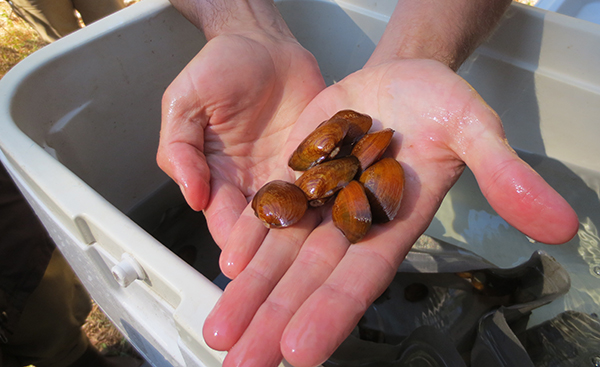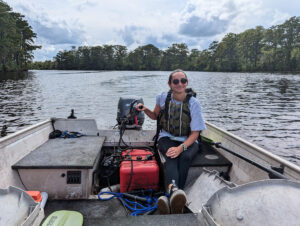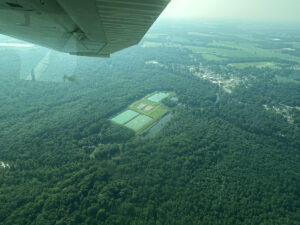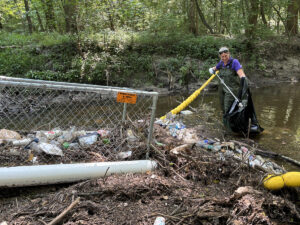News
Freshwater mussel gains endangered species act protection in North Carolina, Virginia
Posted on November 17th, 2021
From the Center for Biological Diversity
 ASHEVILLE — Following a petition and lawsuits by the Center for Biological Diversity, the U.S. Fish and Wildlife Service has listed the Atlantic pigtoe freshwater mussel as threatened under the Endangered Species Act and designated 563 river miles of protected critical habitat in North Carolina and Virginia.
ASHEVILLE — Following a petition and lawsuits by the Center for Biological Diversity, the U.S. Fish and Wildlife Service has listed the Atlantic pigtoe freshwater mussel as threatened under the Endangered Species Act and designated 563 river miles of protected critical habitat in North Carolina and Virginia.
Found on the coastal plain, the Atlantic pigtoe has been lost from more than 60% of its range. Only a few individual mussels survive in most locations because of water pollution from development, agriculture and logging.
“After so many years of foot-dragging by the Fish and Wildlife Service, it’s a relief to finally see the Atlantic pigtoe protected under the Endangered Species Act,” said Perrin de Jong, an Asheville-based staff attorney at the Center. “The Southeast is the world capital of freshwater mussel biodiversity, and most of these mussels are facing extinction due to the rampant abuse of our rivers and streams. Without federal protections, many of these unique and important creatures will vanish forever.”
The Atlantic pigtoe was first identified as needing federal protection in 1991. The Center and allies petitioned for protection of the mussel in 2010. In 2014 the Center sued the Service for failing to protect the species, which led the agency to propose Endangered Species Act protections in 2018. But the Service neglected to list the mussel, and the Center sued for protection again in February 2020.
The Atlantic pigtoe is a 2-inch-long, yellow to dark-brown mussel that often has beautiful streaks across the back of the shell. It is unique in that its shell is rhomboid in shape, and the outer surface has an odd texture like cloth or parchment.
The pigtoe is sensitive to pollution and has been wiped out in areas with poor water quality. It was once widespread along the southern Atlantic slope, ranging from the Ogeechee River basin in Georgia north to the James River basin in Virginia, but has been completely wiped out from Georgia and South Carolina. It is now only found in North Carolina and Virginia. Only a few individual mussels now survive in most locations, and just three populations are considered healthy.
The species is threatened by dams and by water pollution from development, agriculture and logging. In South Carolina the pigtoe once lived in the Savannah River drainage but has not been collected in the state in more than 100 years. It is now primarily found in the Pee Dee River system of North Carolina and in other North Carolina watersheds, including the Cape Fear, Catawba, Neuse, Pamlico and Roanoke river basins.
Today’s critical habitat designation includes approximately 563 river miles in Bath, Botetourt, Brunswick, Craig, Dinwiddie, Greensville, Halifax, Lunenburg, Mecklenburg, Nottoway, Pittsylvania and Sussex counties in Virginia, and Durham, Edgecombe, Franklin, Granville, Halifax, Johnston, Montgomery, Nash, Orange, Person, Pitt, Randolph, Rockingham, Vance, Wake, Warren and Wilson counties in North Carolina.
Mussels improve water quality by filtering small particles from the water as they eat. More species of freshwater mussels are found in the Southeast than anywhere else in the world, but 75% of the region’s freshwater mussels are now imperiled. Thirty-six species have already been lost to extinction.
Related News

Riverkeeper monitoring Tar-Pamlico Water Trail
July 25th 2024

Rain ramps up trash-trap cleanouts
July 25th 2024

Riverkeeper, intern take on emergency trash trap cleanout
July 25th 2024

Tar-Pam Riverkeeper investigates Cub Creek turbidity
July 25th 2024

Heavy rains lead to sky-high turbidity on Lick Creek
July 25th 2024

Riverkeeper: What goes up, must come down
July 18th 2024

Greenville’s trash trap gets emergency cleanout
July 18th 2024

Sound Rivers gets close up of cyanobacteria
July 18th 2024

